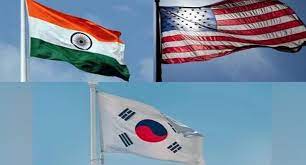NEW DELHI: In what comes across as a response to China’s advancement in critical technologies, India, South Korea and the US yesterday conducted a trilateral technology dialogue in Seoul.
The three countries expressed commitment to expand cooperation in critical and emerging technologies in support of shared economic and national security interests. They will look to spur innovation and economic growth, building more resilient technology supply chains and delivering technology solutions for the broader Indo-Pacific region.
A statement, which was released today, said India, South Korea and the US discussed opportunities to expand cooperation in semiconductor supply chains, telecommunications and digital public infrastructure, artificial intelligence, quantum, space, advanced materials, clean energy and critical minerals, defence industrial development and production, and biotechnology.
“They also reaffirmed commitment to take measures to protect sensitive technologies,” the statement said.
The trilateral is a follow-up of the US-India Initiative on Critical and Emerging Technology (iCET), which was inaugurated in January 2023, and the US-South Korea Next Generational Critical and Emerging Technology Dialogue held in December 2023.
The Indian team was led by Lekhan Thakkar, Joint Secretary of the Indian National Security Council Secretariat. Tarun Chhabra, Senior Director of the US National Security Council, and Dr Seth Center, Special Envoy for Critical and Emerging Technology of the US State Department, headed the American team.
The South Korean delegation was led by Wang Yunjong, Deputy National Security Adviser of the South Korea National Security Office.
The White House had, in the late 2023, urged the initiation of National Security Council and National Security Office-led consultations with like-minded partners on critical and emerging technologies. This includes launching an informal trilateral technology dialogue with India in the early 2024.


